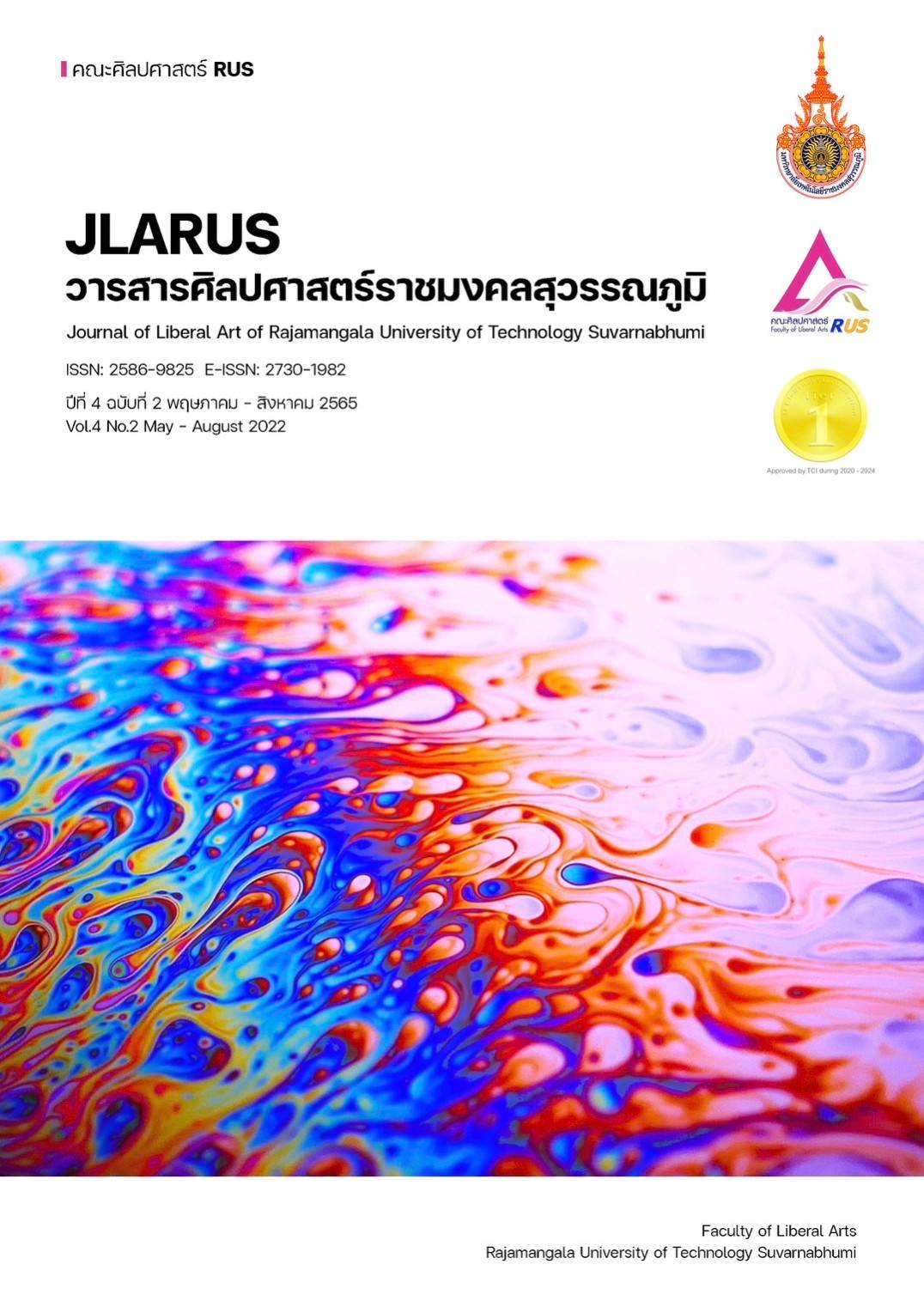THAI PERFORMING ARTS: THE STATEOFBORDERLESS ARTSTOPROMOTE THAILAND ABROAD
Main Article Content
Abstract
This academic document is to study Thai Performing Arts as the state of borderless arts to promote Thailand abroad. It represents the identity of the Thai nation and is a tool for cross-cultural communication, especially in the implementation of cultural diplomacy policies of Thailand. In 1900 during the Reign of King Chulalongkorn, there was a Thai dance troupe, named Bussamahin, under Mr. Bus’s management, to perform in Paris Exposition Universelle and exhibit in other European countries. Nowadays, the Ministry of Foreign Affairs of Thailand has implemented Thai Performing Arts as a tool to create an image of Thailand by organizing Thai festivals around the world. This case study conducted by online focus group discussion with the former Thai Ambassador in Chile as the Producer, the head of Thai cultural group as the Performer, and the manager of cultural event company as the Programmer resulted in the conclusion that Thai Performing Arts is significant tool for cross-cultural communication because of their beauty, brilliance, benignity and, more importantly, borderless to impress audiences in cross-cultural audiences. This study is useful to confirm that Thai Performing Arts can create a good memory and image of Thailand and, certainly, should be a soft power of Thailand.
Article Details

This work is licensed under a Creative Commons Attribution-NonCommercial-NoDerivatives 4.0 International License.
References
ญาณิศา บุญประสิทธิ์. (2559). นาฏศิลป์: สื่อเพื่อการประชาสัมพันธ์ และเผยแพร่วัฒนธรรมไทยในเวทีประชาคมอาเซียน. วารสารศาสตร์, 9(1), 183-214.
ตะวัน บัววัฒนา. (2561). ประมวลภาพผลงานการแสดงในงานเทศกาลไทย ณ ประเทศชิลี. กรุงเทพมหานคร: 189 คอมมิวนิเคชั่นส์ อินเทลลิเจนซ์.
พืชภพ มงคลนาวิน. (2559). การทูตเชิงวัฒนธรรมของไทยในสหราชอาณาจักร: โอกาสและความท้าทาย. ในรายงานการศึกษาส่วนบุคคล (Individual Study) หลักสูตรนักบริหารการทูต รุ่นที่ 8สถาบันการต่างประเทศเทวะวงศ์วโรปการ. กรุงเทพมหานคร: กระทรวงการต่างประเทศ.
รุยาภรณ์ สุคนธทรัพย์. (2561). การบริหารจัดการทรัพยากร Soft Power ของไทย (Invigorating Thailand’s Soft Power Resources). รัฏฐาภิรักษ์, 60(3), 47-55.
เรือนไทย.วิชาการ.คอม.(2553). รูปเก่าเล่าเรื่อง-เมืองบางกอก 4. สืบค้น 24 เมษายน 2565. จาก http://www.reurnthai.com/index.php?topic=5923.150.
สถานเอกอัครราชทูต ณ กรุงปารีส. (2443). สมุดภาพ LE SIAM L’EXPOSITION UNIVERSALLE. France: The Royal Thai Embassy.
สโมสรสราญรมย์. (2541). สราญรมย์: ฉบับที่ระลึก ครบรอบปีที่ 55. กรุงเทพมหานคร: อมรินทร์พริ้นติ้งแอนด์พับลิชชิ่ง.
สำนักงานคณะกรรมการวัฒนธรรมแห่งชาติ กระทรวงวัฒนธรรม. (2548). ความหมายวัฒนธรรม. สืบค้น 1 พฤษภาคม 2563. จาก openbase.in.th.
สุรพล วิรุฬห์รักษ์. (2547). นาฏยประวัติ. กรุงเทพมหานคร: จุฬาลงกรณ์มหาวิทยาลัย.
อภินันท์ หะสุนทร. (2561). การทูตเชิงวัฒนธรรม: นโยบายต่างประเทศของไทยต่อประเทศเพื่อนบ้านอินโดจีน. วารสารการเมืองการปกครอง, 8(3), 192-206.
อมรรัตน์ เทพกำปนาท. (2551). ความหมาย แนวคิดและประเด็นที่เกี่ยวกับ “วัฒนธรรม”. สืบค้น 1 พฤษภาคม 2563. จาก www.satit.up.ac.th/BBC07/AroundTheWorld/anth/19.htm.
อสิ ม้ามณี. (2555). การใช้ Soft Power ในการส่งเสริมความสัมพันธ์ระหว่างประเทศ: กรณีศึกษาการดำเนินการของทีมประเทศไทย ในเนปาล.ใน รายงานการศึกษาส่วนบุคคล (Individual Study),หลักสูตรนักบริหารการทูต รุ่นที่ 4 สถาบันการต่างประเทศเทวะวงศ์วโรปการ. กรุงเทพมหานคร: กระทรวงการต่างประเทศ.
อุไรวรรณ เคหะเปรมะ. (2556). การใช้ Public Diplomacy เพื่อส่งเสริมความสัมพันธ์ระหว่างไทยกับเขตคันไซ.ในรายงานการศึกษาส่วนบุคคล (Individual Study)หลักสูตรนักบริหารการทูต รุ่นที่ 5 สถาบันการต่างประเทศเทวะวงศ์วโรปการ. กรุงเทพมหานคร: กระทรวงการต่างประเทศ.
เอนก นาวิกมูล. (2543). ศิลปวัฒนธรรม. กรุงเทพมหานคร: มติชน.
เอนก นาวิกมูล. (2545). นาฎกรรมชาวสยาม. กรุงเทพมหานคร: สายธาร.
อเนก นาวิกมูล. (2563) ละครเจ้าพระยามหินทร์กับนายบุศย์มหินทร์. ศิลปวัฒนธรรม, 41(7), 18-31.
Hall, Edward T. (1990). The Silent Language. New York: Anchor Books.
Nye, Jr., Joseph S. (1990). Bound to Lead: The Changing Nature of American Power. New York: Basic Books.
Nye, Jr., Joseph S. (2004) Soft Power: The Means to Success in World Politics. New York: Public Affairs.
Vuving, A. L. (2009). How Soft Power Works. Retrieved May 1, 2020. From http://apcss.org/Publications/Vuving%20How%20soft%20power%20works%20APSA%202009.pdf.


